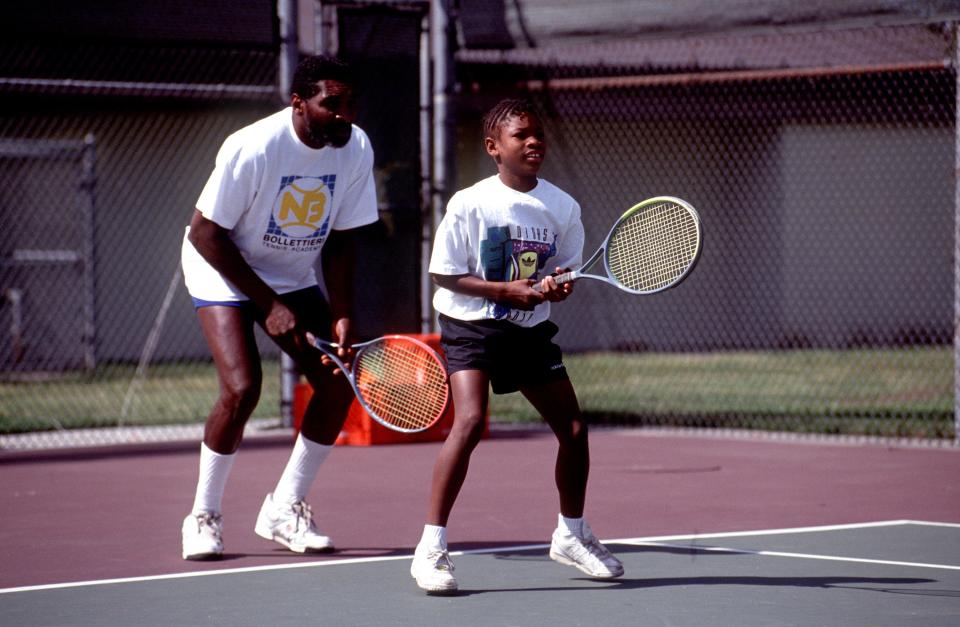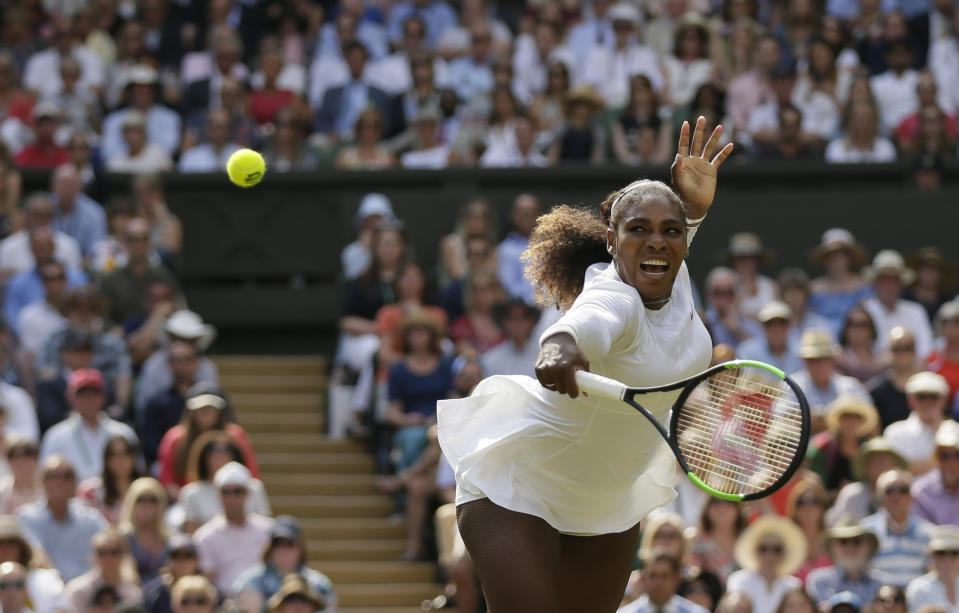The moment of truth that has Serena Williams on the cusp of history
Serena Williams was 9 years old. Her sister, Venus, was 10. This was 1991, back in Compton, California. The girls had been coached until then by their father, Richard, and mother, Oracene, both of whom learned the game by watching instructional videos and reading books.
Now Richard had determined that they would need an elite, professional coach to get them to fulfill their potential, which he envisioned as multiple Grand Slam championships.
Each would eventually clear such a lofty bar, of course. Venus has won seven. Serena will seek her record-tying 24th Saturday in the Wimbledon finals against Angelique Kerber.
Serena is doing it at age 36 and a little over 10 months after giving birth to a daughter and surviving two serious, post-delivery emergency surgeries, including one for blood clots in her lungs.
“Almost didn’t make it, to be honest,” Serena said Thursday.
This finals run and possible eighth Wimbledon title is a testament not merely to her talent. It’s proof of her competitiveness, a competitiveness that was evident in 1991, on a morning when everything changed for Serena Williams.
Rick Macci was, and remains, an elite, professional coach out of Haines City, Florida. He, most recently, had taken 10-year-old Jennifer Capriati and turned her into a pro by the age of 13. Within months, Capriati reached the semifinals of the French Open.

Just about every young player, and their parents, wanted to work with Rick Macci. He was smart. He was tough. He was innovative. Richard Williams was among many who called him, talking up his two daughters.
The problem was, neither Venus nor Serena were playing on the national junior circuit against the very best competition. Richard believed in training, not travel. Also, with limited means, it was more economical to spend long hours hitting worn-out balls on the cracked public courts on the corner of East Compton Boulevard and Lime Avenue near their home.
Normally, Rick Macci wouldn’t give someone without a national pedigree a second look. He was inundated with top talent seeking to hire him. He could only work with so many of them. You had to be incredible.
Venus, older and taller than Serena, had shown enough potential on the local Southern California circuit, however, that Macci had heard of her. The idea of these parent-taught, African-American sisters was intriguing. So, too, was the colorful Richard, who invited Rick to come out and scout his daughters.
“[Richard] said, ‘The only thing I can guarantee you is I won’t let you get shot!’ ” Macci later wrote in his autobiography, “Macci Magic: Extracting Greatness from Yourself and Others.”
Out Macci flew. Both Venus and Serena, despite their tender ages, knew this was a big thing. This was an important coach coming to see them. If they didn’t impress him, would another top coach be interested? They were confident kids from a confident family, but could they really win Grand Slams coming out of city courts and not an elite academy?
The next morning Richard picked up Macci and said they were headed to the “Compton Hills Country Club,” a family joke about the public courts. Macci thought it was a real country club. He was shocked when he arrived.
“There were about 20 guys playing basketball and there were another 15 people, at least, passed out on the grass,” Rick recalled. “There was broken glass and beer bottles everywhere. … It was really a culture shock.”
Macci began to wonder if this was worth it. This was a tryout like no other. Richard had to get everyone to clear out, then sweep the court, then bring out the family-collection of balls, which they held in an old shopping cart, not a regular ball hop.
Then the girls began to hit. Macci put them through rudimentary drills, just trying to see their form, their power, their precision. It didn’t go well. Both Venus and Serena were good, but not good enough. It was clear they hadn’t had top-line coaching. They made up for slightly sloppy fundamentals with sheer athletic ability.
It’s not that they were bad players – they were quite good by almost any standard. It’s that Rick Macci’s standard was the very best of the very best, kids that had done years of carefully coached drills to pound out even the slightest imperfection.

“I’m looking at this and I’m thinking, ‘This is a train wreck!’ ” Rick wrote. “‘This is all hype and I cannot believe I’m in Compton, California, ruining my weekend.’ I didn’t think they were really that good. … I thought Venus and Serena looked like decent athletes but technically they were all over the map, just because they were improvising. You could tell they just didn’t have quality instruction.”
Macci might have left, but Richard had driven him to the park and he had no idea exactly where he was. Instead, he decided to switch things up. Rather than just hit balls back to him, he wanted to play against the girls, putting them in competitive situations.
In an instant, everything changed. What Venus and Serena didn’t know about the ideal grip or swing, they did about fighting for each shot, chasing down balls, finding the will to win points. They may not have been technically great. They were great, though. There was a fire and a focus to them that startled the coach.
Backed up against a rusty, inner-city tennis fence, the Williams sisters had come out blasting.
“Right then and there, their stock rose immediately,” Macci wrote. “I looked cosmetically and I saw what I wanted to see. And I come from a vast background of information and I passed judgment that I thought they were limited. Now when they start competing I saw the preparation get a little quicker, I saw the footwork get a little faster, I saw consistency raise a little higher …
“The way they competed, and they didn’t want to lose the point … to me that’s always the X factor,” Macci wrote. “Venus and Serena had a deep-down burning desire to fight and compete at this age. It was unique. Unreal hunger.”
Rick Macci was convinced. He was ready to bring the family to Florida to kick Venus and Serena’s training into high gear (they would work with him and other coaches before eventually turning pro). He was even further convinced when Venus, during a break in training, decided she’d leave the court to get some water by turning cartwheels and walking on her hands. You don’t see that in tennis every day. Macci began dreaming bigger and bigger.
“‘I think you have the next female Michael Jordan on your hands,'” Macci told Richard Williams, pointing to Venus.
“No, I’ve got the next two Michael Jordans,” Richard said, pointing at Venus and Serena.
The rest is history, a history that keeps repeating itself, even still.
Serena took 14 months off due pregnancy, the birth of Alexis Olympia and the complications and recovery that followed. Last fall she could barely walk, let alone train. She battled the natural challenges of being a new mom. She suffered a pectoral injury in the spring from overuse. In the run-up to Wimbeldon, she didn’t practice her serve for over three weeks.
Yet here she is in the Finals. She’s crushing the field. She’s dropped just one set. Whatever isn’t perfect is being made up for with the same sheer desire to dominate that she and her sister showed Rick Macci that morning long ago.
“Winning and losing is my life,” Serena said this week.
Now as then. Then as now.
More from Yahoo Sports:
• Kellen Winslow Jr. faces additional charge of raping unconscious teenager
• Isaiah Thomas agrees to 1-yr deal with Denver Nuggets
• Shady McCoy’s ex-girlfriend claims ‘he set me up’
• Inside LiAngelo Ball’s debut in LaVar’s league

